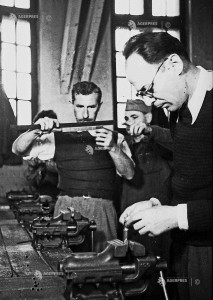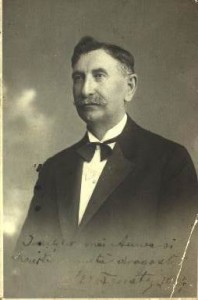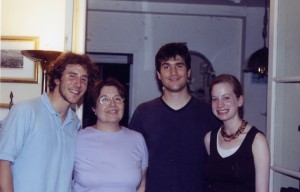Levi Memoir 1937-1979 Bucharest, Romania
When Beno arrived in Bucharest, he enlisted as an apprentice at a live-in vocational trade school, Ciocanul (The Hammer) sponsored by JOINT a jewish philanthropic organization. As an orphan he qualified for free tuition and board.
Bassea, in Bucharest, socialized with Butu Faierstein a cousin of Moise also originally from Falticeni, who had an apartment in Lahovary Street. They both liked to dance and Butu invited her a few times to ballroom dancing sessions. Maya remembers Butu as an elegant and polite gentleman often talking about his sister Sura.
In 1939, Bassea became sick with cancer and coincidentally, Ruta became pregnant in the same year with Maya.
Bassea loved to caress, Rutza’s pregnant stomach, predicting the child to be a beautiful girl. Unfortunately, Bassea passed March 1939 without ever seeing Maya who was born on May 1939.
In Maya’s view Bassea, a beautiful tall, blond with blue eyes was given an unlucky hand in life. She was better educated than women her age, able to read and comprehend the Bible. Maya remembers the bible left after her death in their Bucharest apartment.

While a teenager, Bassea had lost her mother, and had to take care of her father and brothers. Later, she had married Moise, a widower with four children, including a new born baby. In the process, she separated from her family who emigrated to England. On top of all these, her husband was still pining after his first wife, though he probably was kind and gentle with her.
Other Family tid-bits
Simon Fenster, family cousin, became very rich by working as an administrator of the Rossetti-Tescano properties. There he met George Enescu, famous Romanian musician, who visited often and they became good friends. His children grew up on that property.
Around 1938 or 39, we found out that Milutz died in a train accident. This was the official version. The unofficial version was that his business partner threw him out of the train. That was a big tragedy in our family.
By 1939, with the rise of Hitler in Germany and his cronies in the rest of Europe, Romania began to experience a growing intense nationalist movement that led to a fascist dictatorship.
Excerpt of Beno’s Memoir – Bitter Memories
In 1939, I finished the trade school and began job hunting. During the summer, one dorm was left open for graduates who had no place to go. As an orphan I had the right to stay there. The school administration took work orders, and we worked in the shops, in order to make ends meet. In those days’ food was cheap. I still remember the fresh salami, crusty, dark bread, and a special yogurt made from sheep’s milk. With the little money we earned, we could afford to eat in a few inexpensive restaurants, where the wine and bread were free.
In July or August, Mr. Ringelstein, the school administrator, found a position for me at a nearby factory, taking care of time cards. The American director was a friend of Ringelstein’s, and his reference helped me get the job. The factory was a branch of the famous “Ford Motor Company”, which assembled cars and trucks. It was a good job, and well paying. I remember how proud I was when I brought my first paycheck home. I gave it all to my sister, Rutza. Joseph, my brother in law, took me to the department store on Queen Elizabeth Boulevard, and bought a lot of clothes for me. I never looked more dapper than I did back then.
Joseph worked as an accountant for one of the Aushnit’s enterprises. Aushnit was a great capitalist, and the owner of half of Romania’s metal industry. Joseph was involved in politics as well. He was in the leadership of the Romanian Social Democrat Party, an officially tolerated organization. The Social Democrats used to hold their meetings in a pub well stocked with food and wine. It so happened that the owner of this pub was the father of Paul Niculescu-Mizil, a future communist leader. By the way, while in power, comrade Paul Niculescu-Mizil would declare that his father was a member of the illegal Communist Party, in order to secure a very good pension for him.
But let’s return to our story. Joseph “guessed” that I was involved with the anti-Nazi movement since I was often coming late home. He told me: “I know you are not coming from a date. You were spreading manifestos. I am talking to you like a brother. In fact you are our little brother. What you do is very dangerous. You can lose your life, and endanger the entire family”.
A few weeks later, Joseph mentioned that the Social Democrat Party had a secret meeting with representatives of many progressive parties, including the Communist Party, in order to establish an “Anti Fascist Front”. All future activities were to be dispatched from this common anti fascist front henceforth. As a result, the spreading of manifestos was forbidden “to avoid risking people’s lives”. That was fine in theory, but what of my obligation to save the country from the Nazis?
It was 1940, and ugly events were taking place. I do not intend to outline the entire history of this period to you, but rather mention a few key moments. Ten years of unparalleled prosperity for Romania were winding down. King Carol II was forced to abdicate. The “National Legionary State” is proclaimed, led by a coalition government between the Iron Guard, a nationalistic, fiercely anti-Semitic party, and General Mihail Antonescu. After seizing the power, the Legionary government issued racial laws, and introduced forced labor.
Jewish actors, singers and musicians were fired from the Opera, theaters, and Philharmonic Orchestra. Many were, subsequently hired at the Yiddish theater, “Barasheum”.
Jewish workers were fired from factories. They were exemplary workers, and the production started to decline once they left. Jewish intellectuals were fired from public jobs and newspapers. Other racial regulations were established like the law of “Romanization”. Jews had to perform “forced labor” on the roads, fields and construction .”Legionary Commissars” were placed in every Jewish store, company, and factory to enforce the law.
All Jewish students were expelled from the Universities. In the primary and high schools, Jewish kids were so persecuted that most of them had to transfer to Jewish schools. Jewish leaders managed to obtain permission for jewish only primary schools and universities and they paid the teachers’salaries. These schools were forbidden to advertise, and the state would not recognize the graduation papers they issued, which basically made them worthless in the labor market.
Sohica was a principal of one of the schools and Ruta taught in an one of the elementary schools. Incidently, jewish intellectuals fired from their jobs were employed as teachers by their Jewish Community . One of such high schools, Cultura, had some extremely good teachers. Mihail Sebastian, a famous playright and Henric Sanielevici, journalist and literary critic.
As I mentioned earlier, the Legionaries introduced a policy of forced labor.
I and Joseph got an order to present to one of these forced labor posts. This presented a very serious dilemma for us. Working there meant that we couldn’t go to my regular job. That meant no income. One of the American directors came to the rescue and switched me to the night shift. During the day I did forced labor: railroad work in the summer, and street cleaning in the winter. At night I went to my job in the factory. Luckily, the work load was light at night, so I could sleep a few hours. The foreman let me sleep. He knew I had to go in the morning to forced labor.
Most people from the factory, especially the older ones, were very sympathetic to my circumstance. They always brought me bread and whatever food they could afford.
Once, I was sent to clean snow from the streets alongside very “distinguished” company. With me were Jewish singers who had been fired from the Opera. They sang arias from operas from dawn to dusk. Their rendering of the Aida was truly magnificent. People came out from their houses to listen. Afterwards they brought us tea and rolls.
End of Excerpt
The Iron Guard rose against the regime on January 21, 1941. During a three-day civil war, eventually won by Ion Antonescu with support from the German army, members of the Iron Guard instigated a deadly pogrom in Bucharest, the capital city. Particularly gruesome was the murder of dozens of Jewish civilians in the Bucharest slaughterhouse. After the victims were killed, the perpetrators hung the bodies from meat hooks and mutilated them in a vicious parody of kosher slaughtering practices.
During the Bucharest Progrom, the entire family, including Felea’s brother hid in the apartment of one of Felea’s Christian friends for the duration of the pogrom. That friend took a high risk to protect our family.
Between August 23, 1944 when Soviet Army liberated Romania from Germans and December 1947 when King Mihai was exiled the Soviet sponsored Communist Party took over the Government.
In February 1948, all members of the Romanian Social Democrat Party were summoned by the communist party, in a huge conference hall and urged to dissolve the Socialist Party and join together with the Romanian Communist Party, to form Romanian Workers’ Party (PMR – Partidul Muncitoresc Romin). The ones that agreed on the spot to join PMR were given a certificate, the others were arrested as soon as they walked out of the hall. Joseph and his brother Israel were jailed for a few days, until their powerful friend, Stefan Voitec, pulled some strings to free them up.
A few years later, Jews were urged to “integrate”, and therefore give up their Jewish names for Romanian ones – and so, Feller name was changed to Felea. Joseph Feller became Joseph Felea and Israel Feller became Mitica Felea.
Beno, was against changing his name, saying that if the name Levi was good for anti-Nazi activities, should also be good for communist Romania. He was right, but not successful. While Joseph and Mitica held important, powerful jobs, Beno spent all his working years as a clerk at the Association for Cultural Relationships with Soviet Union.
Maya’s birth certificate still shows her name at birth being, Maya Beauty Feller. She grew up in Bucharest, in a loving, warm family. She fondly remembers her uncle Beno, spending lots of time with her and Rutza, and being her best playmate. He carried Maya on his back, played with her on the floor and took long walks with her and Rutza.
First school Maya remembers was the Note Dame de Sion, run by catholic nuns.
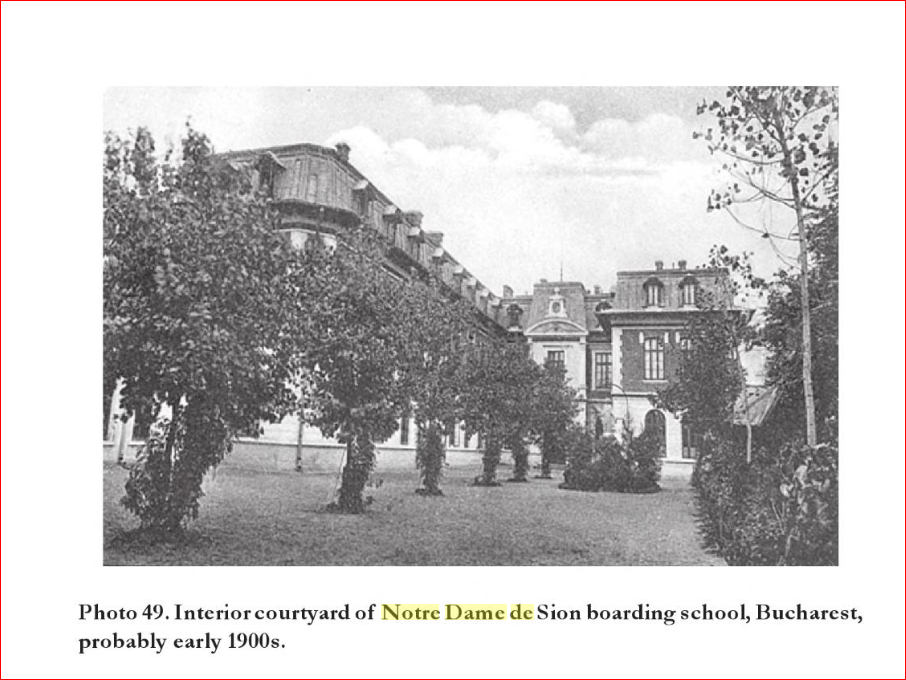
Noter Dame de Sion ,Bucharest
The school existed in Bucharest, between 1898-1949, hosted about 130 pupils and delivered an excellent education. The nuns, unlike their counterparts in other countries were warm and loving. Maya had a great time there. After the communist government closed the school in 1949, Maya joined a Jewish elementary school where Rutza worked as a teacher, and then proceeded to public middle school and high school.
Maya was beautiful and multi-talented in music, drawing, dance and academics. Her parents worshiped her and she bloomed.
Along the years, during her visits to Beno’s family she enchanted his kids with whimsical fairy tale stories. As she narrated the stories, she was also drawing ethereal ferries, princes and castles. The children were transfixed.
For a while, Tania, Beno’s daughter, eleven years younger, used to visit Felea’s family after school on Saturdays. Maya and Tania, would sit together and studied at the same table and later, Rutza would serve lunch.
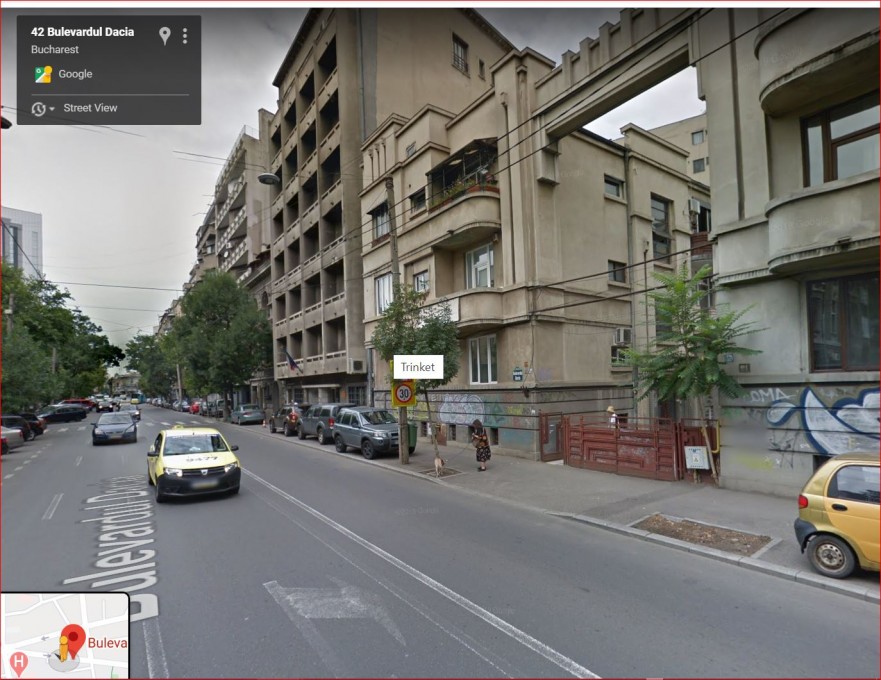
Bucharest – Felea,Family Residence
Maya was one of the few young women that applied and succeeded to get into Electronics Department of the Polytechnic Institute. She completed the University with high grades and later worked as an Engineer with the Institute of Automation Projects. Somewhere along those years she met and fell in love with Viorel Dan, a brilliant University colleague. As students and young professionals, for a while they had an active social life with many friends, many trips and tons of entertainment. However, life in Communist Romania, under Ceausescu’s presidency was getting more and more oppressive, with no light at the end of the tunnel.
There were long lines for food and supplies, long hours at work with minimal remuneration, no freedom of speech or any other type of freedom.
Like many other talented professionals, Viorel, felt oppressed and toyed with the thought of deserting Romania. The possibility presented itself during a work trip to France, when he impulsively defected.
Of course, Romanian Secret Service (Securitatea), immediately descended on Maya and Viorel’s older brother.
The agents would show up unexpectedly ,either at their home or at their place of work, asking for Viorel’s coordinates so that they could bring him back. The agents were insistent and intimidating. Maya was terrorized by these visits and afraid of being jailed or worse. She could not sleep at night and could hardly function. At one time she was summoned at the main police station of Bucharest where she went with Joseph, fearing the worst. As they approached the gate, Viorel’s brother was coming out un-harmed, and that was re-assuring. The interview though was a classic movie type interrogation with closed doors, taping and flooding lights in the eyes. The terror lasted for almost three years.
Maya applied to emigrate to Israel and finally succeeded, and joined the Fenster family in Israel, Bersheva, Ovidiu and Sophica.
The up-side of the “Securitatea” terror was that Maya would leave Romania with no regrets whatsoever. The moment Viorel, learned of Maya’s exit, he came to Israel and began the legal process to take Maya with him to Paris.
End of Maya’s Story.
We hope the continuation will be written by the younger generation.


